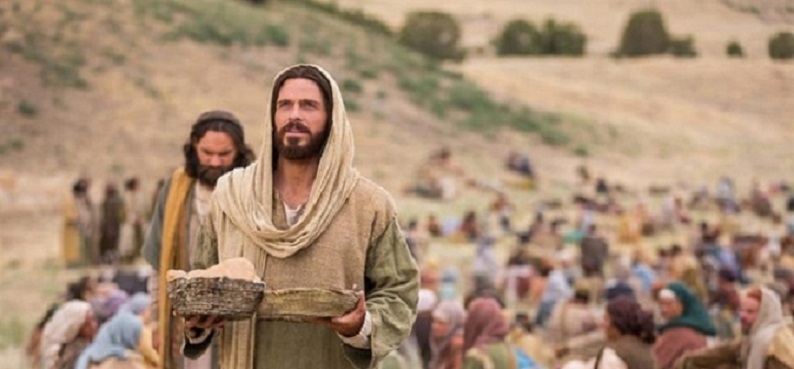Is 55:1-3
Rom 8:35, 37-39
Mt 14:13-21
We have all had the experience of our plans not working out. We have it in our minds to do something and we are prevented from doing what we had intended. Somebody unexpectedly calls as we are about to go out, or while we are on the way somewhere someone crosses our path and we get delayed. We can have a negative reaction to that kind of experience. We view the unexpected caller or the unplanned encounter as an interruption. Yet, from another perspective, attending to the interruption can often be turn out to be the most important thing we could be doing. From a faith perspective, the Lord can be in the interruption as much as in what we originally planned to do.
In the gospel reading, Jesus and his disciples had a plan to go to a lonely place where they could be by themselves, but their plan never came to pass. Jesus’ original plan was a very reasonable one. He had just heard the news of the death of John the Baptist and he needed time alone with his disciples to take in this grim news. When we get bad news, such as the news of the death of a loved one, we often feel the need to be away from others, perhaps just in the company of family members and friends. We need to withdraw a little to come to terms with what we have heard. Yet, Jesus’ very reasonable intention to be on his own with his disciples was interrupted. When he stepped ashore from the boat, people were waiting, not just a few people, but a huge crowd. Jesus did not react negatively to this unexpected interruption. Rather, as the gospel reading says, ‘he had compassion for the crowd’. He let go of his own need for quietness and isolation and he identified with the people in their need. The needs of others took priority over his need for peace and quiet. He understood that God was calling out to him through these people.
What followed was a wonderful experience of communion around a shared meal in the wilderness. It is often the way that the interruptions we experience in life turn out to be an experience of communion with someone or some group. I remember recently I was on my way somewhere and was conscious of wanting to get to where I was going when someone I hadn’t met for over seven years came towards me on the footpath. I sensed in myself an initial irritation but little by little I began to appreciate this moment of communion. By the time we moved on from each other I was very grateful for this encounter; I felt that both of us were blessed by the unexpected moment of communion. Probably some of our best memories of being in communion with others relate to sharing meals. When we sit down around a table to eat, there is always more going on that just eating. Meals deepen friendships; they develop relationships. The gospels suggest that Jesus spent a great deal of his time eating with others, often with those who would have been considered undesirable for one reason or another. Jesus wanted people to experience communion with himself, and with God who was present and at work in his life.
We can never be sure what exactly happened at the meal in the wilderness that is described in today’s gospel reading. If Jesus’ disciples had their way the meal would not have happened. Their advice to Jesus was ‘Send the people away’. Jesus countered their advice head on, ‘Give them something to eat yourselves’. Jesus was already in communion with these people through his work of healing their sick; he wasn’t just going to send them away. The disciples could only find five loaves and two fish with which to feed the crowd. Yet, Jesus insisted that this small amount of food be brought to him. Then, in a way we cannot fully understand, Jesus fed the crowd through these tiny resources. The gospel reading is reminding us that the Lord can take the little we give and work with it in surprising ways. The smallest gesture can multiply and bear abundant fruit. The short time we give to someone who unexpectedly crosses our path can be a moment of great grace. The Lord can work in life-giving ways through the little that we have if we are generous with it. The Eucharist is a powerful expression of that truth. We offer the Lord our simple gifts of bread and wine and he offers them back to us as his body and blood. In various ways the Lord is always saying to us, ‘give them something to eat’. We all have something to give and, if we place it at the service of others, the Lord will work through us in ways we could never have anticipated. Amen







